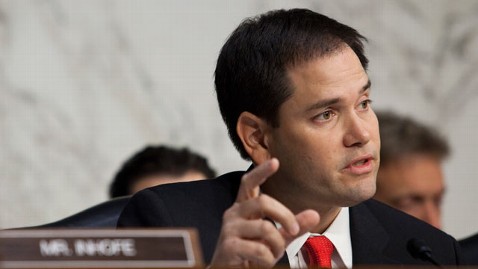
Drew Angerer/Getty Images
Less than an hour after President Obama finished outlining his plan to address gun violence in America, Republicans in Congress fired back, criticizing the president for attacking the Second Amendment.
Sen. Marco Rubio, who many conservatives look to as a viable presidential candidate in 2016, said he would “oppose the president’s attempts to undermine Americans’ constitutional right to bear arms.” Instead, he believes Congress should focus its efforts on keeping guns out of the hands of criminals and the mentally ill.
“Nothing the president is proposing would have stopped the massacre at Sandy Hook. President Obama is targeting the 2nd Amendment rights of law-abiding citizens instead of seriously addressing the real underlying causes of such violence,” Rubio, R-Fla., wrote. “Rolling back responsible citizens’ rights is not the proper response to tragedies committed by criminals and the mentally ill.”
PHOTOS: Sandy Hook Elementary School Shooting
Michael Steel, spokesman to Speaker John Boehner, reacted to the president’s proposals in a brief statement, putting the onus on the Democratic Senate to lead the legislative path to tougher gun laws.
“House committees of jurisdiction will review these recommendations,” Steel wrote in an email after the announcement. “And if the Senate passes a bill, we will also take a look at that.”
House Judiciary Chairman Bob Goodlatte, R-Va., said House Republicans “welcome the recommendations of this task force and will consider them” but his committee will plot its own course in addressing gun violence.
Transcript: Obama’s Remarks On Gun Violence
“Good intentions do not necessarily make good laws,” Goodlatte, who received an A rating from the NRA, stated. “As we investigate the causes and search for solutions, we must ensure that any proposed solutions will actually be meaningful in preventing the taking of innocent life and that they do not trample on the rights of law-abiding citizens to exercise their Constitutionally-guaranteed rights.”
House Education and the Workforce Chairman John Kline, R-Minn., also said his committee would convene a hearing “to examine school safety and ways to protect our children.” Rep. Fred Upton, the chairman of the House Energy and Commerce committee is also planning to review mental health laws.
Other House Republicans were skeptical of the effectiveness of the president’s ideas, such as enacting another ban on assault weapons.
“The fact is these firearms are no different than other legal firearms except for their exterior design,” Rep. Pete Olson, R-Texas, wrote. “Claiming to address gun violence by offering a failed, illogical action is nothing more than a red herring to target the constitutionally protected liberties of law abiding gun owners.”
“More gun restrictions may allow Washington to congratulate itself, but will never change the sickness and depravity that drive someone to murder indiscriminately,” Rep. Steve Pearce, R-N.M., wrote in a statement.
“The president’s plan approaches the problem of gun violence from the wrong direction,” Louisiana Republican Rep. Rodney Alexander, who also received an A rating from the NRA, wrote in a statement. “This proposal will not stop criminals from getting their hands on weapons and using them for harm.”
“Guns are not the problem, evil people are,” Rep. Dan Beneshik, R-Mich., wrote in a statement. “The only thing these proposed restrictions would do is prevent law-abiding individuals from protecting their homes, children, and businesses.”
“The Second Amendment is non-negotiable,” Rep. Tim Huelskamp, R-Kansas, wrote in a statement. “The right to bear arms is a right, despite President Obama’s disdain for the Second Amendment and the Constitution’s limits on his power.”
INFOGRAPHIC: Guns in America: By The Numbers
Huelskamp said the debate should instead focus on “what fuels a very small segment of the population to inflict harm and instill fear” and the Obama administration should enforce gun laws already on the books.
“This means holding Hollywood accountable for its culture of violence and death, and talking about mental health issues and the responsibilities of families and communities,” Huelskamp, who received an A+ rating from the NRA, stated. “The Obama Administration is neglecting its obligation to enforce current law. Apparently public safety matters only when there’s political gain to be had.”


















